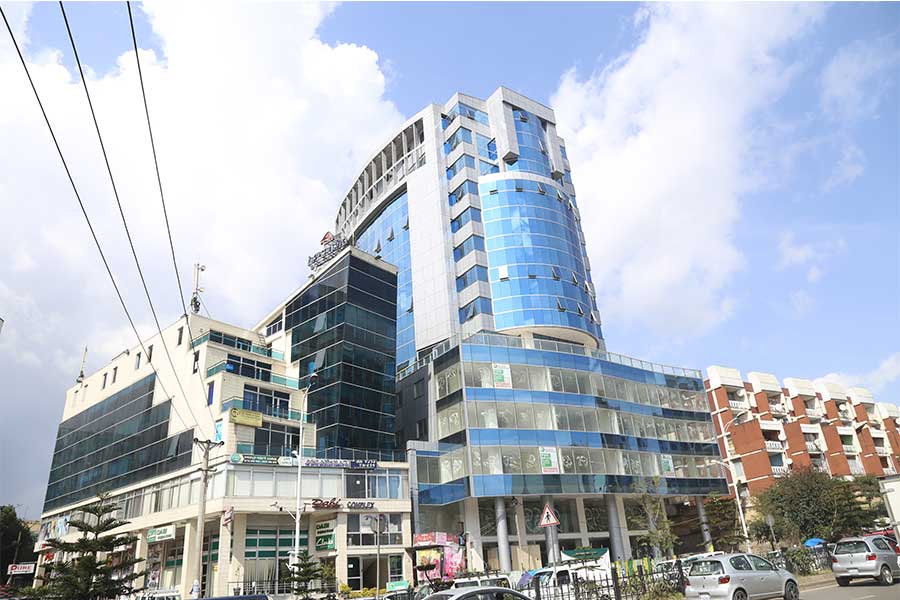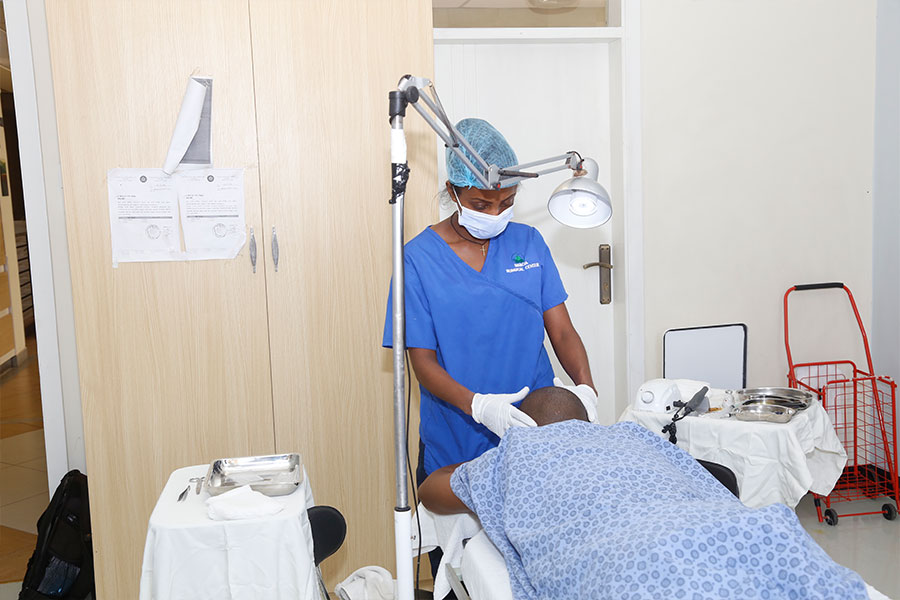
Featured | Sep 28,2019
Last year, Yitayish Abebe, a mother of four, attended a family event. The occasion was one of a kind. As opposed to her usual experience, food was not served by the hosts, who were just sitting and enjoying the moment. To her astonishment, everything went well at the event where she had delicious food cooked and served to her by a catering company, which, in addition to the meals, had also brought the utensils and equipment needed for the occasion.
Excited, Yitayish did not just go back home empty-handed, taking with her their contact address. Learning from the experience of her relatives, Yitayish did not hesitate to call the food service provider to organise another event and save the hustle and bustle on her part. This is how she met her favourite catering company to date, Kal's Kitchen, which she has since hired for a fellowship attended by 50 people and her son's graduation.
“Raising four kids and working long hours, I don't usually have the energy to make food, especially during occasions, which requires more time and being zealous," said Yitayish, describing her circumstances. For her, escaping traditions that require women to handle household chores is now as simple as ABC, thanks to catering service providers, which seem to be cropping up everywhere.
The catering industry is not new to Addis Abeba, though few establishments have been successful in the market thus far. Previous experience indicates that catering services used to be provided as an extension of the hotel and restaurant business, while their customers were usually large organisations that tend to have events frequently. As consumer habits change, it looks like the market is entering into a new normal.
"As people started to feel the trouble of doing the bulk of work while cooking food, catering service providers are becoming the best, if not only, option among households to serve a variety of food which their guests are craving for," says Fisseha Asres, a hotel and tourism consultant having more than two decades of experience.
Prices normally range from 80 Br to 450 Br a plate but can go as high as 1,000 Br depending on the kind of food being served.
With the business requiring a comparatively small amount of capital, individuals with great cooking skills together with entrepreneurial ability have also started to explore this opportunity; a situation that contributes to increasing employment as businesses begin to hire cooks, assistants, and servers. Kalkidan Seyoum, the owner of Kal's Kitchen, is one of such a kind.
Kalkidan never imagined that her cooking skills could easily be turned into a business opportunity until she received encouragement from her family and friends, who always enjoy her meals whenever they come to her house to attend gatherings that she organises. In 2011, she decided to capitalise on her skill with a capital of just 10,000 Br to buy kitchen utensils.
"I didn't expect that the business would boom swiftly," said Kalkidan. "When I started the business, I had around 20 customers. Now I have over 100 and sometimes serve up to 1,000 people at a single event."
Most catering service providers cover a wide range of events, from birthdays and baby showers to weddings and mourning ceremonies, with very few focusing on a particular food or certain kinds of events. Catering prices are determined by the number of guests who are going to be served and the types of food ordered by the client. On average, they currently charge between 80 and 450 Birr a plate, while it can go as high as 1,000 Br if a client wants to have delicacies like doro wet. Prices also go up when clients request that food be packaged for them to take abroad.
The peak season for those in catering is usually during festive seasons, particularly in September, January, May, and June, and after the end of fasting seasons. This however does not mean that business activities cease during the slack season.
An Ethiopian and foreign cuisine buffet presented by Belladonna Catering and Food Delivery, one of the many caterers cropping up to meet the growing demand from households.
"Even though we won't be as busy as the peak season, we depend on meetings, events, birthdays, hiking, and baptism celebrations when there is not much work," said Bisrat Belayneh, managing director of Belladonna Catering and Food Delivery, which has been operational for the last three years.
In addition to the seasonal nature, the size of some events can also present an issue to caterers like Kalkidan. She explained that she has limited capacity when it comes to serving a large crowd, which requires more space and is usually handled by big establishments that have been in the business for a longer time. The latter applies to Leule International Catering, situated behind Bole Medhanialem Church, which has been in the market for over 18 years.
Having a wealth of experience in the market and a strong business network with hotels, restaurants, and event organisers, the company has the capacity to serve up to more than 20,000 people. While it has no fixed price when being asked to provide service, it charges clients based on guest count, price of ingredients, labour and delivery costs, as well as the type of meals that will be served.
"Even though caterers are growing in number, we have a difference in the quality of services and capacity," said Leule Alemu, owner of the catering service provider, which uses social media platforms and its website to promote its services and acquire more customers. "As people want to save cost and energy, we are becoming the preferred choice of many."
A boom in demand, however, does not necessarily mean things are going without hindrance.
"Convincing customers requires little effort, but getting a place to do our job has never been easy," said Kalkidan, whose efforts to get a working space from the Addis Abeba City Administration bore no fruit.
Despite not facing such a challenge, Leule also says that the absence of support to the catering industry is preventing it from reaping the benefits on offer in the growing market.
"We should be given a preferential treatment to provide catering services for international events," says Leule. For him, this is like killing two birds with one stone – promoting the country's rich cuisine while making money.
Even more challenging, however, is the surge in inflation, which reached 20.6 percent last month, driving up the cost of catering and sometimes leading to disputes with clients because of unexpected price increases for ingredients. This, coupled with the impacts of COVID-19 on consumer spending and business activities, has led to a change in consumer sentiment, especially among those in the middle-income bracket.
"It looks like we've been shifting to upper-income households and big businesses even before we realised it," concludes Bisrat.
Regardless of the obstacles, the catering industry is likely to continue growing as customers like Yitayish are unlikely to go back to cooking at home. She shared with Fortune that she is even planning to buy ready-made doro wet from her caterer for the coming Easter holiday.
PUBLISHED ON
Apr 30,2021 [ VOL
22 , NO
1096]

Sunday with Eden | Dec 30,2023

My Opinion | Sep 06,2025

Featured | Jan 03,2021

News Analysis | May 06,2023

Dec 22 , 2024 . By TIZITA SHEWAFERAW
Charged with transforming colossal state-owned enterprises into modern and competitiv...

Aug 18 , 2024 . By AKSAH ITALO
Although predictable Yonas Zerihun's job in the ride-hailing service is not immune to...

Jul 28 , 2024 . By TIZITA SHEWAFERAW
Unhabitual, perhaps too many, Samuel Gebreyohannes, 38, used to occasionally enjoy a couple of beers at breakfast. However, he recently swit...

Jul 13 , 2024 . By AKSAH ITALO
Investors who rely on tractors, trucks, and field vehicles for commuting, transporting commodities, and f...

Oct 25 , 2025
The regulatory machinery is on overdrive. In only two years, no fewer than 35 new pro...

Oct 18 , 2025
The political establishment, notably the ruling party and its top brass, has become p...

Oct 11 , 2025
Ladislas Farago, a roving Associated Press (AP) correspondent, arrived in Ethiopia in...

Oct 4 , 2025
Eyob Tekalegn (PhD) had been in the Governor's chair for only weeks when, on Septembe...